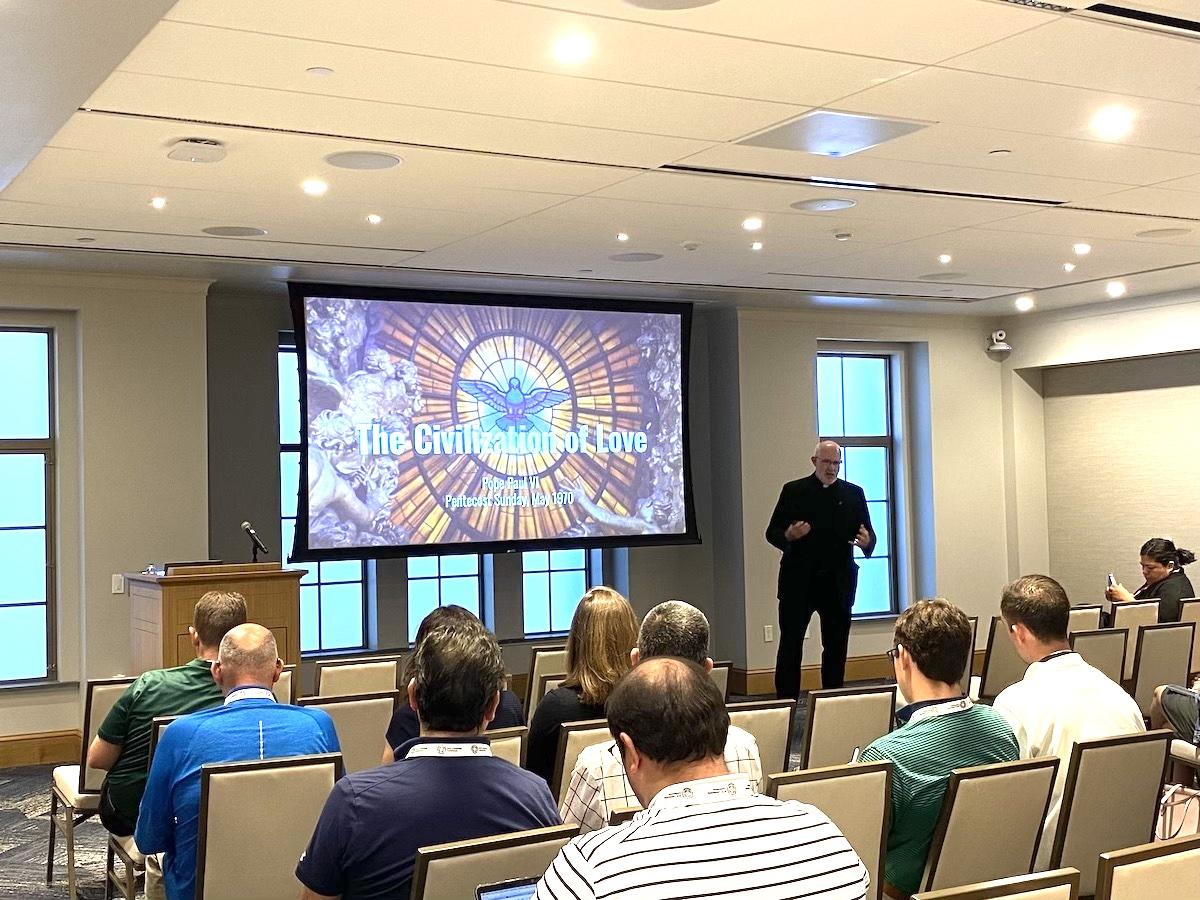We aim to form disciples with hope to bring at the Alliance for Catholic Education, a belief that comes from the Constitutions of the Congregation of Holy Cross, the founding order of Notre Dame. This charism is rooted in the idea that education in the faith is about teaching that “even the cross could be borne as a gift.” Thus we must remember that being disciples with hope to bring starts from the premise that life and our work are full of difficulties and challenges.
We need hope because there is pain and suffering in the world. Those in Holy Cross set out to bring that hope to those they serve, and our optimism and hope as Catholic school leaders must be equal to their zeal in facing such difficulties. This juxtaposition of hope and struggle was borne out over three days on campus this month at the first ACE Leadership Conference. More than 200 leaders who serve in a variety of roles in Catholic education came to share and analyze strategic solutions to key issues facing Catholic schools in a post-Covid world.
 As I reflect on the conference, a few things stand out to me. First, as with the ACE Missioning Mass at the end of each summer, it is inspiring and uplifting to see the quality of the individuals who are dedicatedly working and leading in Catholic schools across the country. They truly meet the ideal of vocation, those who are called to the mission of service to Catholic schools. It is difficult to hear brutal facts about Catholic schools and then wrestle with potential solutions for how best to meet those challenges. But there was great enthusiasm and excitement from those in attendance about the work ahead.
As I reflect on the conference, a few things stand out to me. First, as with the ACE Missioning Mass at the end of each summer, it is inspiring and uplifting to see the quality of the individuals who are dedicatedly working and leading in Catholic schools across the country. They truly meet the ideal of vocation, those who are called to the mission of service to Catholic schools. It is difficult to hear brutal facts about Catholic schools and then wrestle with potential solutions for how best to meet those challenges. But there was great enthusiasm and excitement from those in attendance about the work ahead.
I was also struck by how challenging Catholic school leadership is at this moment in time. We have residual anxiety and frustration from the pandemic, and that leads to increased tension with parents and others in the community. The political polarization we see across the country is sadly mirrored somewhat within the Catholic Church, and being in the midst of that as a leader is very challenging.
Our time together demonstrated the importance of being in the “in-between” space, both between the different aspects of polarization, and between the challenges we face and the potential solutions. It is usually those who have never experienced leadership first hand that say certain issues are black or white – that the solution is simply staying the same course and consequences be damned. But those in leadership know that what is much more common are the gray areas, where decisions are not clear and the right choice is usually a compromise between two strongly held views. The conference held such tension at times and allowed leaders to sit in the gray areas and just be as they discussed and debated ideas with colleagues.
These interactions have an added benefit because innovative solutions often arise from collaboration and constructive conflict. Some have an idealistic view of the innovator sitting alone in a room, devising new and creative ways to do things. But this is rarely the case – what is much more common is innovation coming out of time together, debating solutions, building relationships and sharing successes and struggles with like-minded colleagues. The progress can be slow, and we have to celebrate the small victories, but our hope and prayer is that through such interactions potential solutions will arise.
We were able to do this work together at Notre Dame, a sacred space filled with multiple places to engage our faith in the everyday movement around campus. While here, the leaders explored the artwork and sculptures around the campus, each carrying a weighty spiritual meaning for those who experience them each day. While it was wonderful for them to spend time in these spaces, what I reflect on is that they are returning to equally sacred spaces at their Catholic schools. As beautiful as this campus is, the Catholic schools across the country that do the heroic work each day of making God known, loved and served to the students and families of the community are equal in beauty and impact. Our collective prayer is that those sacred spaces will benefit from the wisdom and grace inspired by the conference and the Catholic school leaders who give their whole heart and soul to the work.
 Alliance for Catholic Education
Alliance for Catholic Education
